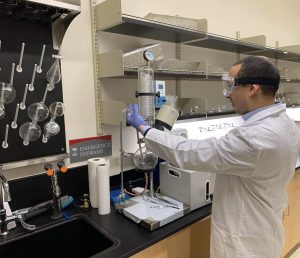The newest member of the University of Connecticut’s Technology Incubation Program (TIP) is working to revolutionize the way we think about sterile surfaces at home, at work, and in health care settings.
Bioengineering startup DeBogy Molecular Inc. has developed proprietary surface modification technology that can render a wide range of materials from textiles to plastics permanently anti-viral, anti-bacterial, and anti-fungal without changing the look, shape, or feel of the original material.

Dr. Houssam Bouloussa, DeBogy co-founder and vice president of operations, is a fellowship-trained orthopedic spine surgeon. In his practice, he routinely encounters patients suffering from implant-related surgical site infections. These infections often require re-operating or other drastic methods.
“Bone infections are extremely hard to eradicate,” Houssam Bouloussa says. “They raise a significant issue in terms of morbidity and mortality.”
Houssam Bouloussa connected with Othman Bouloussa, a world-renowned chemist who develops antimicrobial grafting techniques, and other researchers to build the DeBogy Molecular team.
“The antimicrobial aspect was fundamental to me because I felt we needed to work together and bridge our different worlds,” Houssam Bouloussa says. “Physicians are not used to working with chemists.”
Because of the chemistry of the molecules, DeBogy’s molecules naturally bind to cellulose-based surfaces such as cotton and wood. Other surfaces like glass, metal, and plastics use additional processes to bind with the molecules.
“Chemistry is in the DNA of our company,” Bouloussa says. “We want a sort of marriage between the molecules and the surface.”
Company data demonstrates DeBogy’s technology prevents the formation of biofilm, the leading cause of recurring infections.
“Our goal is to render any high-touch material permanently germ-free,” DeBogy Molecular CEO Wayne Gattinella says.
More Than Lab Space
Originally based in Pittsburgh, DeBogy Molecular moved its research and development labs to Connecticut in October 2020, attracted to the opportunities offered by UConn’s incubator and the state. TIP connects startups to state-of-the art resources at UConn and so many opportunities, according to the DeBogy Molecular team.
“The combination of UConn’s world-class research facilities and real-world entrepreneurial collaboration is a perfect marriage of the academic and business communities,” Gattinella says.
TIP has a strong commitment to incubating new innovation and connecting early stage companies with the resources to help them successfully commercialize their products, says Mostafa Analoui, executive director of venture development and UConn’s incubator.
“UConn is committed to supporting high-potential startups like DeBogy Molecular that want to locate in Connecticut to advance their technologies and their companies,” says Analoui. “We’re thrilled to be able to contribute in this meaningful way to economic development for our state.”
The UConn location also affords DeBogy Molecular the opportunity to work closely with the University’s internationally renowned researchers and industry partners from various fields.
“Connecticut is fantastic in terms of the impact we can have,” Bouloussa says. “Our ability to tie the industry and the chemistry is ideal here. I don’t think many other states offer this.”
DeBogy Molecular is in active discussions with leading companies in the aerospace, automotive, construction, and entertainment industries to test their technology on surfaces relevant to these industries.
“We’re looking to combine our patented surface modification IP with the product development and manufacturing expertise of industry leaders to create a superior product they can provide to their customers,” Gattinella says.
Addressing the Present
While DeBogy Molecular’s technology was originally conceived for biomedical purposes, they are shifting focus to address the COVID-19 pandemic.
“The critical need for our anti-microbial technology has never been greater and we don’t feel there’s an adequate solution on the market,” Gattinella says.
In addition to offering the potential to create self-sterile COVID-19-resistant surfaces, DeBogy’s technology is environmentally friendly.
One problem with antimicrobial sprays and coatings is that they release toxic ions into the environment. DeBogy Molecular’s molecules do not leech any toxic ions by nature of their chemistry and the fact that the process is permanent, eliminating the need for reapplication.
“I think it’s possible to fight COVID without sacrificing the next generation,” Houssam Bouloussa says.
Revolutionary Potential
Gattinella, who has led several successful technology startups, including as CEO of WebMD, has learned the key to success is to maintain focus without putting on blinders to other opportunities.
“Successful startups are able to balance continuing research and development with a short list of in-market opportunities, to support the important need for business development while not losing sight of the larger vision you began with,” Gattinella says.
DeBogy’s technology holds the potential to dramatically revolutionize how we think about antimicrobial surfaces.
“We want to disrupt the antimicrobial marketplace,” Gattinella says. “The marketplace is characterized by temporary and inefficient sprays, wipes, and coatings.”
Gattinella says this kind of progress is not far off.
“I joined DeBogy because of the promise of the technology,” Gattinella says. “With the proper resources and continued focus and strong partners we can get there quickly.”



